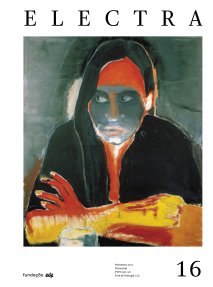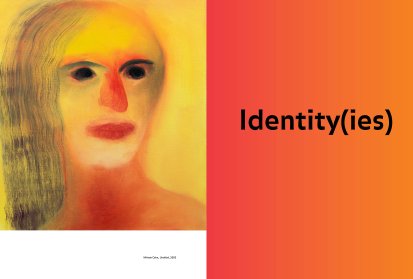Language, incidentally, reflects the polysemy of this belief, as intimate as it is dangerous, by using a single term to underline the modality in which said belief is presented, that is to say the necessity (in as far as needing something and the fact that this something cannot cease being what it is).
Hence something as apparently abstract as identity is revealed as the most ardent of motives; the desire or conatus to be and to carry on being, in the knowledge that one is at all times exposed to ceasing to be, radically. And this on the varying levels on which the belief in identity operates: as an individual or as a member of a family or bloodline, or a nation, a State or, taking it to the extreme, the whole of Humanity. Except that the level of emotivity (and anxiety) decreases as levels of belonging increase, and thus national identity has to be consciously and artificially fostered, with warnings of the ever-present danger of it being lost, while the belief in a State identity, wherever it is not linked to the national one, has barely the ability to elicit any feelings of belonging and identity beyond those generated by the possession of a passport or national identity document, however much the Germany political scientist Dolf Sternberger may, in 19792, have coined the term ‘constitutional patriotism’, something Jürgen Habermas has been defending with particular determination ever since.3
According to this, other than in the case of individual identity (and the ever- possible loss thereof), other feelings of identity have been artificially created to confer sense on an ever-possible handing over of that individuality (to the extent of being willing to sacrifice oneself or to kill patriotically those who want to annihilate the group to which I belong). This artificial belief, interestingly disseminated through family upbringing, education and indoctrination, has its origin in a mythically-reinforced belief (e.g. the Fatherland as an arche). And then, that belief is theoretically dressed up as a logical principle, while also being emotionally coloured due to the conviction (however latent and repressed this may be) of the fragile and precarious character of this communitarian construct. All of the above may be summed up in one single motto, as pithy as it is peremptory: ‘Everything for the Fatherland’. This would be the essence of patriotism, just one step away from patrioterism.4
Faced with such dangerous extremism, it might be worth positing a definition of identity in a logical respect which, however, could also have an impact on the sentimental belief in that intimate identity. In other words: a subject is only identical to itself if its essential and universal aspect (that which it is), on affirming itself as such, recognises the specific and particular difference that makes it exist. That is to say, one cannot just be ‘Spanish’, but rather Spanish in the positive respect of being Castilian, or in the negative one of not-being Catalan or from Navarre, etc.
The crucial step from the belief in identity to the defence of identitarianism depends on this precise nuance. In fact, the identitarian does not accept that comparison, arguing that one is either Spanish in general and nothing else, or one is Spanish in truth by being Castilian or from Madrid, with the obvious danger that, faced with that dilemma, ones reaches a conditional clause of exclusion; if being Spanish is (solely) identified with being Castilian or from Madrid, then being Catalan or from Navarre is not to be truly Spanish, or it is to be so in a reduced and provincial manner.
In reality, it is quite clear what identitarianism conceals: it attempts to impose a mythical and essentialist belief (by which the ‘People’ continues to be the same throughout its history, thereby taking the form of Nation) over the factual reality of an ever-varying, ever-fortuitous existence, due to the contingencies of history. Contingencies which, today, particularly in the Western bloc, represent the transfer of power from the bourgeoisie, founded in mechanised industry, to a new emerging and disruptive financial and technocratic class, based on the absolutisation of information and communication technology. This means the progressive impoverishment of the so-called ‘middle classes’ and the replacement, at lower levels, of the proletariat by ‘zero contract workers’. This transformation from liberalism into global neo-liberalism, speculatively financial and digitally technocratic, further exacerbates the sentiment of a damaged identity, thereby giving rise, by reaction, to the blossoming of populism in its extreme manifestation: national populism.
Populism arises out of the confirmation of a certain heterogony of ends in post-industrial and neo-liberal societies which, always on the verge of collapse, do however paradoxically generate a gap of ever-increasing dimensions between the base and the power. Now then, taking account of the fact that, in democratic regimes, it is the base that chooses the power through elections, what populism advocates most of all is to win (or regain) the hegemony of the ‘people’ beyond the particracy which (according to the normal accusation) distributes that power, in a more or less surreptitious manner, it must be said, using certain core elements of what one might call ‘philosophical populism’.







Share article